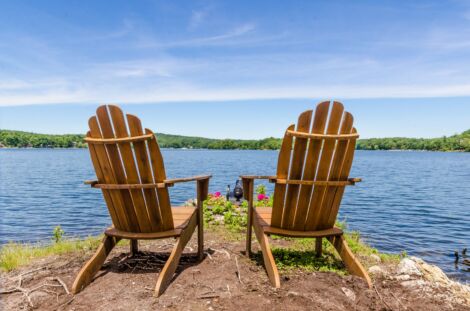7 Things to Consider Before Buying a Vacation Home

There’s plenty of appeal in a vacation home—no hotel reservations, no coordinating with Airbnb hosts, and never sitting through a timeshare presentation. However, whether you’re looking for a lake house, a ski cabin, a beach house, or a condo in the city, there are a lot of factors to consider before buying a vacation home.
Location
Proximity is key when buying a vacation home. A common mistake people make is buying in a location that’s too far to make use of frequently. A good rule of thumb for most people is if it’s too far for a simple weekend getaway it’s probably not a good location. If you’re retired, independently wealthy, or have a private jet then that simple rule doesn’t apply, but for most people closer is better.
Maintenance Costs
Another reason to live within a few hours from a vacation home is you can get there quickly if there’s an emergency with the property (big storm, broken pipes), or if you need to do some basic maintenance. Experts recommend setting aside money each year for maintenance and upkeep expenses, generally 1-2% of the value of the house per year. You’ll obviously save money by doing any repairs yourself, but be prepared to pay more if you have to hire someone. If most residents in that area are seasonal you might be competing with other vacation home owners for one of only a few carpenters, plumbers or handymen in the area.
Weather-Related Costs
Before buying a vacation home familiarize yourself with the area’s year-round weather. Is it prone to hurricanes, floods, temperature swings, or heavy snows? The likelihood of these problems could impact your home owners insurance and maintenance costs.
In addition, look at climate change models to see how the area might change in the years ahead. Will rising sea levels submerge your beach house? Will that ski cabin see a significant reduction in snowfall? Is your lake cabin at increased risk for forest fires?
Mortgage
As if the idea of paying two mortgages isn’t daunting enough, you should know that a loan for a second home is slightly more complicated and the rates are usually higher. Second homes don’t qualify for FHA or VA loans, and it’s hard to get mortgage insurance for one, so typically the mortgage rate is slightly higher than that of a first home.
The usual debt-to-income ratio still applies for second homes, and you generally need to have cash reserves that prove you can make mortgage payments on both your homes for 2-5 months to qualify for a loan. And if you plan on renting the vacation home out more than a couple weeks a year, you’ll probably pay a higher mortgage rate because now it’s technically an “investment property” and not just a vacation home.
Rent it out or not?
A good way to recoup some of the money you’ll spend buying a vacation home is to rent it out, but there are costs associated with that as well. First off, you’ll need to see if you can even legally rent out your home by checking local laws/ordinances, any applicable home owners or condo association rules, etc. If renting is an option you’ll probably need to hire a management company or arrange something with Airbnb to clean and promote it. These companies can take anywhere from 25-50% to manage your rental property. In addition, you’ll likely be taxed on incomes you derive from a rental property.
Furnishing costs
Buying a second house also means a buying a second bed, second sofa, second set of dishes… and the price of all those seconds can really add up. Prices vary greatly depending on how you want to decorate and furnish it, but keep in mind a lot of vacation homes are remote and not right down the street from IKEA or other big box shops.
Assorted pests
An empty house can attract all manner of unwanted guests. Whether it’s squatters busting into your forest cabin, river otters setting up house under the deck, or your cousin trying to move in after his spouse kicks him out, you’ll want to take steps to ensure nobody gets in without permission. This could involve additional security features, hiring someone to swing by and check on it, or begging your cousin’s spouse to take him back. Any of these options will cost you time and possibly money.
Finding your dream vacation home
If you’ve settled on a destination, start looking online at homes for sale immediately. Even if you’re not quite ready to buy, you can familiarize yourself with the prices, trends, and types of homes in that particular market. This way when you are ready to buy, you’ll know what to expect and won’t jump for the wrong home.
Looking to buy a beach house, ski cabin, lake house, urban condo, or cabin in the woods? The best way to find the vacation home of your dreams is on Estately.com